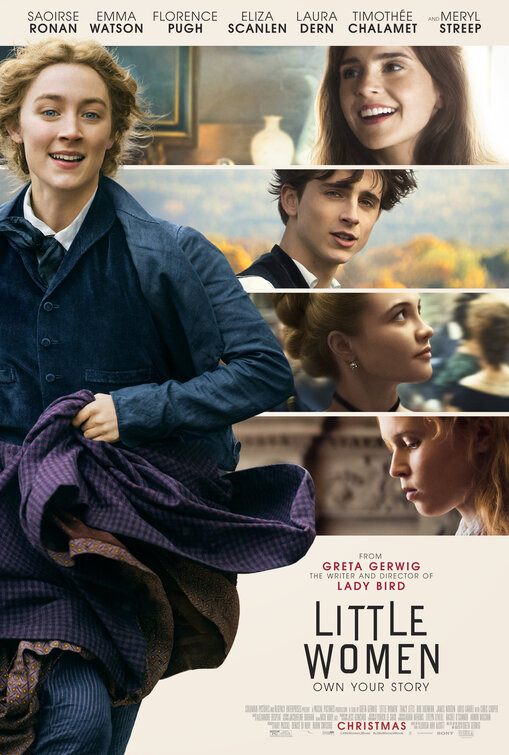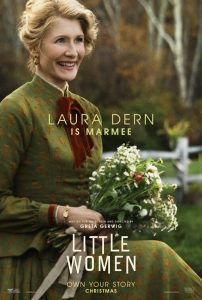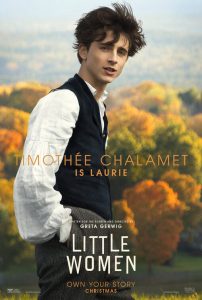Posts Tagged ‘Saoirse Ronan’
Marching Forward

Little Women
Director: Greta Gerwig
Cast: Saoirse Ronan, Florence Pugh, Emma Watson, Laura Dern, Timothee Chalamet, Meryl Streep, Chris Cooper, Louis Garrel, James Norton, Bob Odenkirk
Ladybird director Greta Gerwig skilfully adapts Louisa May Alcott’s bestselling 19th century American novel Little Women for 21st century audiences although her non-linear approach to storytelling could confuse viewers that are not familiar with the original story of the trials and tribulations of the March sisters in Concord, Massachusetts during and after the American Civil War.

Fortunately for Gerwig she manages to assemble an exceptional cast in her gorgeous cinematic remake of Little Women including Oscar nominee Saoirse Ronan (Atonement, Ladybird) as the headstrong writer Jo, Emma Watson (The Bling Ring) as the more grounded older sister Meg and the dazzling Florence Pugh as the younger sister Amy.

Oscar winner Laura Dern (Marriage Story) plays the four sisters mother Mamie and Bob Odenkirk briefly appears as the girls’ wayward father. Eliza Scanlen plays the youngest sister Beth who is excellent at piano playing.

What is most impressive about Little Women is the brilliant casting of the male parts in this version, particularly Oscar nominee Timothee Chalamet (Call Me By Your Name) as Theodore “Laurie” Laurence, Oscar winner Chris Cooper (Adaptation) as Laurie’s grandfather Mr Laurence and French actor Louis Garrel (The Dreamers, Saint Laurent) as Jo March’s love interest Professor Friedrich Bhaer.

There is also British actor James Norton who was dazzling as Stephen Ward in the BBC series The Trial of Christine Keeler who is cast as Meg’s love interest John Brooke, a penniless tutor.

Little Women is gorgeously shot and the costumes are beautifully designed by Jacqueline Durran who deservedly won her second Oscar for Costume Design for this film.

Equally invigorating is the absolutely brilliant performances of both Saoirse Ronan as the headstrong writer Jo March and that of Florence Pugh as the gorgeous but spoilt younger sister Amy, who received her first Oscar nomination for Best Supporting Actress for Little Women.

Florence Pugh is really a young star to look out for as her performance is formidable especially opposite screen legend and multiple Oscar winner Meryl Streep (Kramer vs Kramer, Sophie’s Choice, The Iron Lady) as the wealthy and righteous Aunt March as she accompanies the affluent relative to Paris.
Little Women is a gorgeous film, beautifully directed and should be applauded for giving so many young actresses a chance to shine in an exceptionally well-cast and directed film.
Little Women gets a film rating of 8 out of 10 and is highly recommended viewing for everyone. A sparkling triumph set in 19th century America where men had every opportunity and women had to fight for everything or marry a rich husband.
75th Golden Globe Awards
75th GOLDEN GLOBE AWARDS
Took place on Sunday 7th January 2018 hosted by
the Hollywood Foreign Press Association in Beverly Hills, California
GOLDEN GLOBE WINNERS IN THE FILM CATEGORIES:
Best Film Drama: Three Billboards Outside Ebbing, Missouri
Best Film Musical or Comedy: Ladybird
Best Director: Guillermo del Toro – The Shape of Water
Best Actor Drama: Gary Oldman – Darkest Hour
Best Actress Drama: Frances McDormand – Three Billboards outside Ebbing, Missouri
Best Actor, Musical or Comedy: James Franco – The Disaster Artist
Best Actress, Musical or Comedy: Saoirse Ronan – Lady Bird
Best Supporting Actor: Sam Rockwell – Three Billboards outside Ebbing, Missouri
Best Supporting Actress: Allison Janney – I, Tonya
Best Foreign Language Film: In the Fade directed by Fatih Akin (France/Germany)
Navigating the New World
Brooklyn
Director: John Crawley
Cast: Saoirse Ronan, Emory Cohen, Jim Broadbent, Julie Walters, Domhnall Gleeson, Emily Bett Rickards, Jessica Pare, Maeve McGrath, Eileen O’Higgins
After her sparkling debut as the precocious and misguided Briony Tallis in director Joe Wright’s handsome film Atonement, Oscar nominee Saoirse Ronan has made a string of less memorable films including Hanna and The Host until appearing as the radiant lead in this 1950’s love story Brooklyn, where she dazzles as the Irish immigrant Eilis fresh on arrival in New York City.
Director John Crawley’s adaptation of the novel by Irish author Colm Toibin Brooklyn is a soft-focused, brilliantly acting and utterly charming love story. Ronan is superb as Eilis who arrives in the Big Apple and stays at a ladies boarding house run by the ever glamourous Mrs Kehoe wonderfully played by Julie Walters (Billy Elliott).
Soon the sensible Eilis befriends the other guests and while working at an American department store is guided by the fashionable manageress Miss Fortini played by French Canadian actress Jessica Pare who brought added style to the final two seasons of Mad Men.
At an Irish club Friday night social, Eilis meets the charming and dimple-faced Tony, an Italian immigrant, played by Emory Cohen (The Place beyond the Pines). Their initial courtship is cut short when Eilis has to unexpectedly return to Ireland for a family emergency. Back in the Green Isle, she is wooed by the handsome and eligible bachelor Jim Farrell played by Domhnall Gleeson (Anna Karenina, About Time, and Shadow Dancer) in the weeks leading up to her school friend Nancy’s wedding.
Director John Crawley and acclaimed screenwriter Nick Hornby (About a Boy, An Education) do an excellent rendition of making a good old fashioned love story in the manner of Mona Lisa Smile, Circle of Friends and is ably assisted by Saoirse Ronan superbly acting in the lead role, as her character Eilis navigates all the nuances and difficulties of life in the New World.
Audiences should look out for Oscar winner Jim Broadbent (Iris) as the benevolent father Flood as well as Emily Bett Rickards as the cheeky companion Patty last seen on the hit TV show Arrow.
Brooklyn with its gorgeous production design, immaculate 1950’s costumes is reminiscent of a less complicated old fashioned love stories and will definitely find an appreciative audience, judging by how packed the cinema was on a Sunday afternoon. Recommended viewing for those that cherished films such as Circle of Friends, Mona Lisa Smile and more recently The Immigrant starring Marion Cotillard.
Fading Reign of Art Nouveau
The Grand Budapest Hotel
Director: Wes Anderson
Cast: Ralph Fiennes, Jude Law, F. Murray Abraham, Harvey Keitel, Willem Dafoe, Adrien Brody, Owen Wilson, Bill Murray, Tom Wilkinson, Tilda Swinton
Moonrise Kingdom director Wes Anderson assembles a hugely talented ensemble cast led by the irresistable Ralph fiennes as Gustave H. a suave Concierge at The Grand Budapest Hotel who gets embroiled in a whimsical art theft after his benefactor dies mysteriously and her evil son Dimitri played by Adrien Brody pursues the eloquent and flamboyant Gustave in a fictitious republic of Zubrowka representative of a modern day Yugoslavia or even The Czech Republic, but emblematic of a crumbling decadent and ravaged Eastern Europe.
The Grand Budapest Hotel is a wonderful plot, inventive, hilarious, witty and beautifully orchestrated matched by a superb ensemble cast the likes of which haven’t been seen on screen for years including Oscar nominees F. Murray Abraham (Amadeus), Harvey Keitel (Bugsy), Willem Dafoe (Shadow of a Vampire), Bill Murray (Lost in Translation), Edward Norton (Primal Fear), Tom Wilkinson (Michael Clayton), Saoirse Ronan (Atonement) and Jude Law (The Talented Mr Ripley) – all consummate character actors and brilliant performers in the own right.
Each perfectly constructed shot in the Grand Budapest Hotel is a pastiche of old European movies and landscapes reminiscent of a time between the wars when civility was still in fashion. When Old European Hotels were lavish and comfortable establishments with Bell Boys, Lift Operators, Chefs and naturally charming yet slimy Concierges adding to the intrigue of its elegance. When Hotels were places to spend a week, when time was plentiful and guests came to languish in the extraordinary facilities of these beautifully decadent Hotels which populated the ski slopes and small towns of Austria, Germany, Italy and Switzerland.
Even though, the fictional country, Zubrowka is representative of a mixture of Eastern European countries which all suffered under the Nazi’s and then under the Communists, the institutional history of such a charming hotel remained the centre of a town’s attraction, where legends of its fabled guests were passed down over the decades. The Grand Budapest Hotel reflects an era when Art Nouveau reigned supreme especially in the 1930’s. This comedy set in 1932, featuring a complicated and whimsical if not absolutely witty plot is deftly handled by screenwriter Anderson who makes sure each of his cast members whether on screen for a second or for several scenes delivers a perfect performance.
The cast also includes Lea Seydoux, Mathieu Amalric, Owen Wilson and Tilda Swinton. Inspired by the works of 20th century Austrian writer Stefan Zweig, The Grand Budapest Hotel is expertly crafted, dazzlingly assembled and wonderfully executed. A real treat of a film which will sure to delight audiences for years to come much like the Hotel whose guests found its hidden charms suitably enchanting. Highly recommended viewing and a winner of the Grand Jury Prize at the 2014 Berlin Film Festival, The Grand Budapest Hotel is marvelous, whimsical, witty and comical with an underlying menace attached to the action, making the comedy almost tragic in its relevance.
A Lost Chance at Amendment
Atonement
Joe Wright’s sumptious cinematic version of the acclaimed novel Atonement by Ian McEwan is really worth viewing a second time round…
Having read Atonement in 2007 and waited for the big screen version of the tale about real and imagined crimes, war and the devastation of innocence, I was suitably impressed by Wright’s cinematic version of a complex novel by author McEwan. Only on a second viewing do I fully appreciate the intricate variations of a grand tale about innocence, loss and the absolute devastation of World War II on all nations concerned. With a brilliant screenplay by the masterful Christopher Hampton, who brought us Dangerous Liaisons and the elegant film Carrington about the life of Lytton Strachey, Wright propels the viewer into an elegant scene of the snobbish society of English country life that is soon transformed forever at the approaching threat of war… showing both those that profits off war’s destruction and those that lose everything by the infinite devastation of endless violence.
*****
What makes Wright’s film version so brilliant, is his effective use of water as a motif both for purification and as a form of atonement and cleansing, whether its the illicit sexual encounters of a lazy English sultry summer afternoon or the sponging of blood and grime from the wounded soldiers as they return from the Theatre of war, that was France in 1940. From the retreat at Dunkirk to the blitz of London and the losses suffered by all, Atonement paints a grim and prophetic picture of a world without order, direction or compassion, where many must suffer for the mistakes of the few. Wright’s cinematic achievement is that wonderfully long tracking shot on the beaches of France as the English forces prepare for an initial retreat, and the wake of devastation left behind, as one of the central characters Robbie turns and survey the catastrophe of confusion and anarchy. A society on the brink of collapse, seemingly without redemption.
Atonement focuses also on conflicting narratives, embellishments and the dangers of an imagination too rampant to remain real, only realised through the loss of innocence and that inexhaustible sense of wasted time. Besides alternative settings of elegance and destruction, are poignant performances by a superb cast that tackle the subject matter with an earnest command of look and suspense. The original score by Dario Marinelli is brilliant and exceptionally evocative, and is in line with similar films about war, love and lost chances in the tradition of The English Patient and The Remains of the Day.
Audiences should watch out for a superb performance by Saoirse Ronan as the precocious and prying Briony Tallis, who sets in motion a series of misguided accusations which can never be rectified. Saoirse Ronan deservedly received an Oscar nomination for her role as the imaginative 13 year old girl, who does not fully grasp the motives or desires of adults, particularly those of her sister Cecilia played by Keira Knightley and Robbie Turner played by James McAvoy.
Ian McEwan’s novel, Atonement is a multi-layed superbly descriptive account of the erosion of social stability in the face of a world inevitably altered by the onset of the most dramatic event in the 20th century…
The novel is a thought-provoking and intelligent study of English society on the brink of a significant historical turning point, the affects of which still resonate today…
Even if you have seen the film, the novel is worth reading and then set aside a luxurious afternoon to afford yourself a second viewing of Atonement. Both endeavors are enriching and speculative, not to mention thought-provoking… After all, how is a person to atone for an accusation that irrevocably changes the course of a families history forever…
~~~~~~~~~~~~~~














